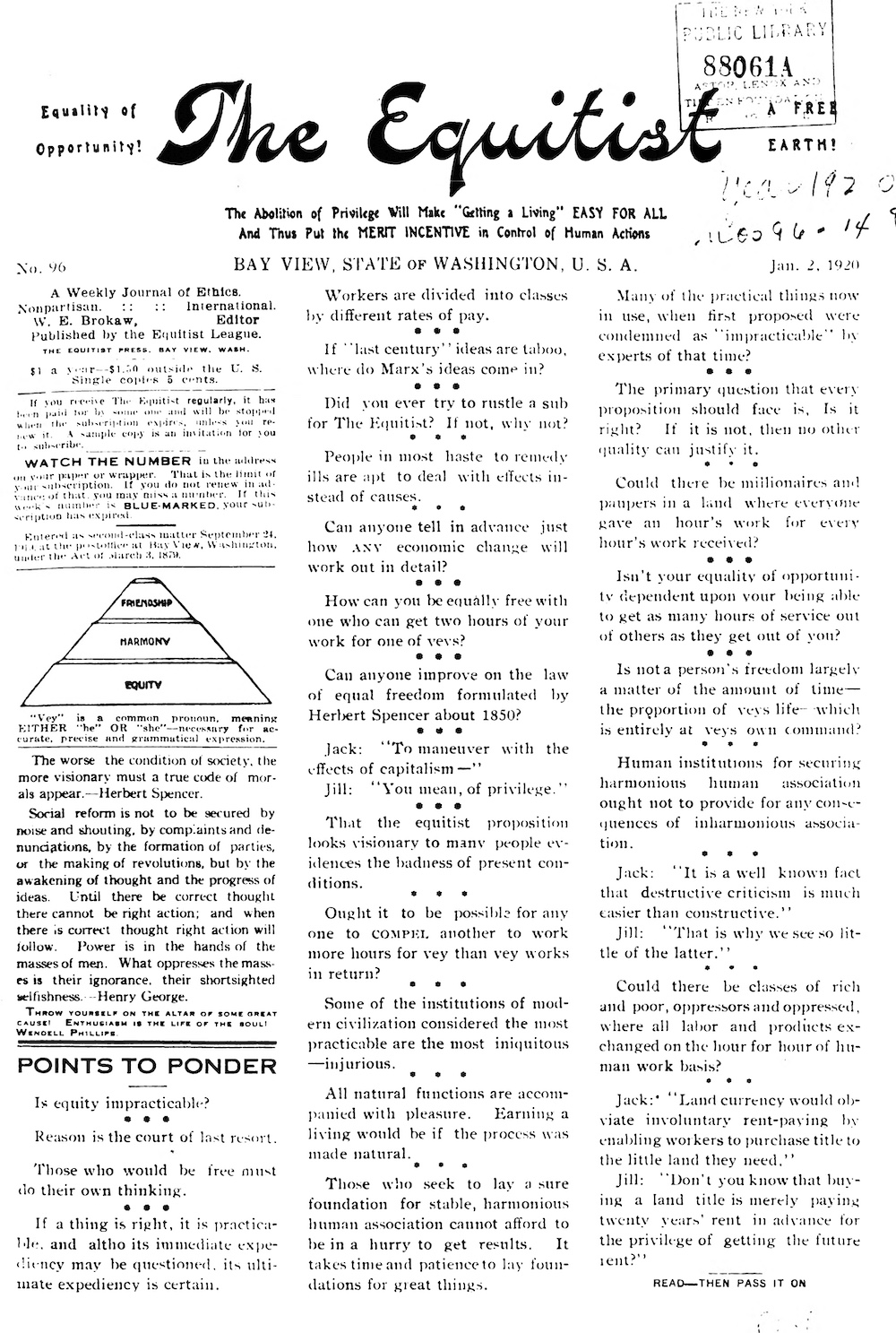

|
| About | Archives | Practices | Contribute | Contacts | Search |
| Periodical: | The Equitist |

|
|
| Summary: |
From Pat Deveney's database:
Equitist, The. This was the organ of the United States Equitist League. The journal was advertised in its inception in Herbert Parkyn's Suggestion, 1906, which boasted that it "is the only periodical advocating Equal Freedom and Annular Evolution. It stands squarely for self government and the total abolition of every form of inequity; and it points the way in clear and fearless words." Warren Edwin Brokaw (1860-1943) was a notable labor theorist, anarchist, libertarian, and single-tax advocate, and in the journal he proposed to discuss "all sociological problems with its readers, making it an open forum for remedial suggestions." Estella Bachman [Brokaw] (1860-1910), the editor of Suggestion, applied the lessons thus learned to a Seabright Child Study Circle and a Booklover's Cub. Bachman was the wife of Brokaw and with him had earlier published a journal of the same name in New York, in 1897. They also published the Single Tax Courier in St. Louis. The Equitist principle was: "Make all natural resources free from price, and thus -- distribute Nature's bounties equitably: distribute public expenses equitably, and thereby do away with rent, interest, profit and taxes. Securing equality of opportunity to all natural persons, making 'getting a living' easy for all and thus replacing the present 'love of money' by the incentive to gain the respect and esteem of others by meriting t. * * * Fix the price of every product at the adult human work cost of production and distribution thus displacing supply and demand from their present abnormal function of price-fixing and restoring to them their true function of determining when, where, how and by whom production is to be conducted." These tired exhortations were joined with a regular crusade against against "occultism" and "new thot" -- at least on the part of Warren Edwin Brokaw: "It is difficult to see what all the wisdom and high attainments of the Hindu adepts has availed, during all the past centuries, in the uplifting of the people of India, to say nothing of the rest of the world, when 'it is known that only about one person in a thousand who has tried in past centuries to reach the exalted plane of the adept, has ever succeeded;' and perhaps not one in a million ever got far enough out of slavery (poverty) to even try. Nor is it easy to see how the modern American " new thot" imitators of the Hindu occultists assist any in the solution of the social problems of today." His wife, Estella, on the other hand, who had edited Suggestion, conducted a regular column on "Department of Original Thot and its Practical Application," which espoused a socially conscious version of traditional New Thought, and the journal was notable for the contributions of Professor Isaac Newton Vail who proposed to "open the doors to the hidden wisdom of the past with his "Annular Evolution Key." Vail (1840-1912) was a Quaker catastrophist whose Vailan or annular or Canopy theory argued that the earth had once been ringed by toroidal ice / vapor rings (the "firmanent" of Genesis), whose collapse caused Noah's Flood and other catastrophic changes on earth. He had earlier published his own journal, The Annular World, in the late 1890s. His books were sold in William Dudley Pelley's journals and his ideas were incorporated by Charles Adiel Lewis Totten in his Our Race. Noted in Hartmann's Who's Who, 1925. NYPL; Harvard University, etc.
|
| Issues: | The Equitist 1920 |
| The Equitist 1921 |
|
|